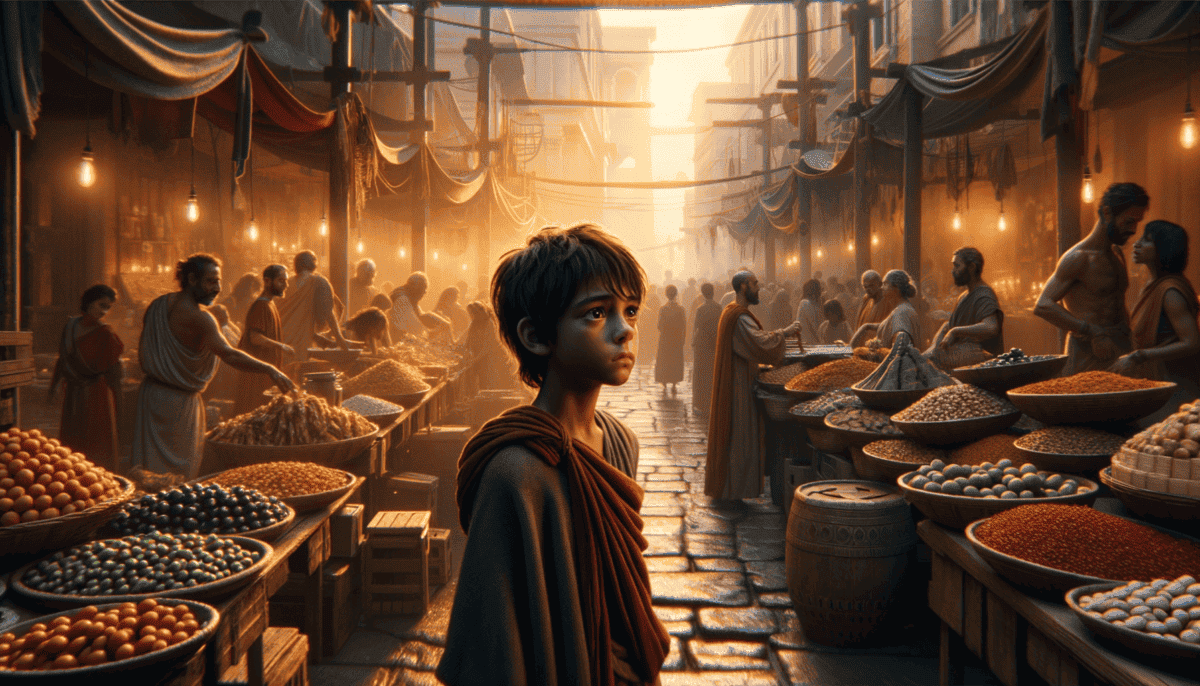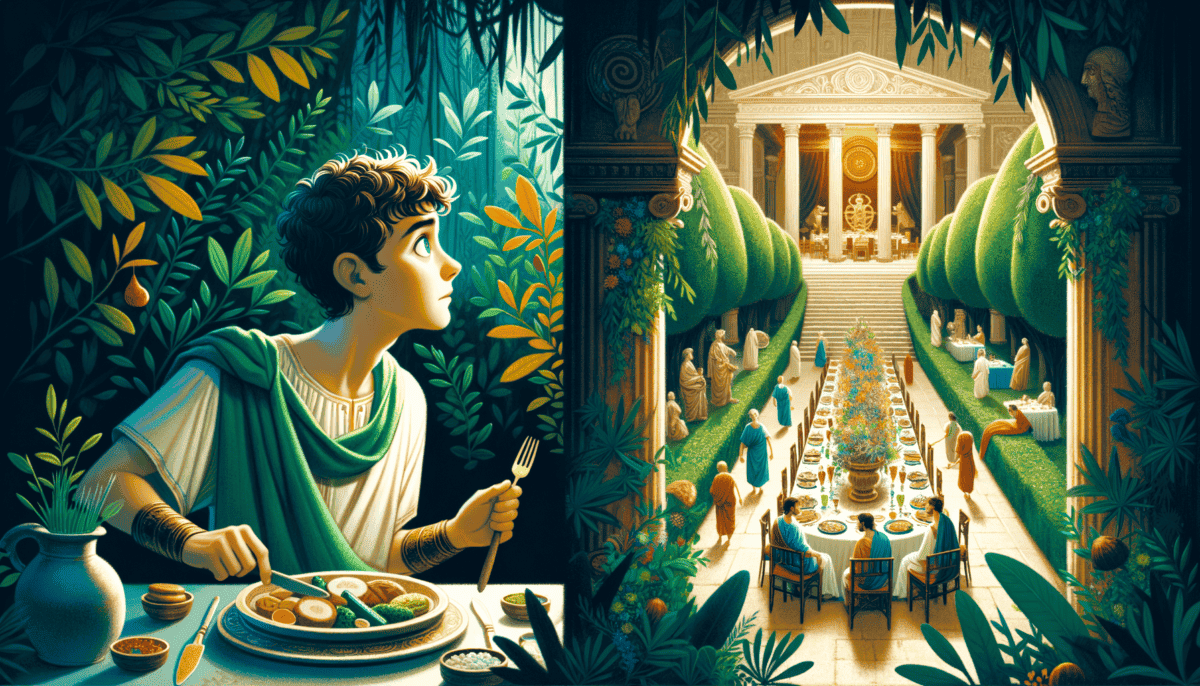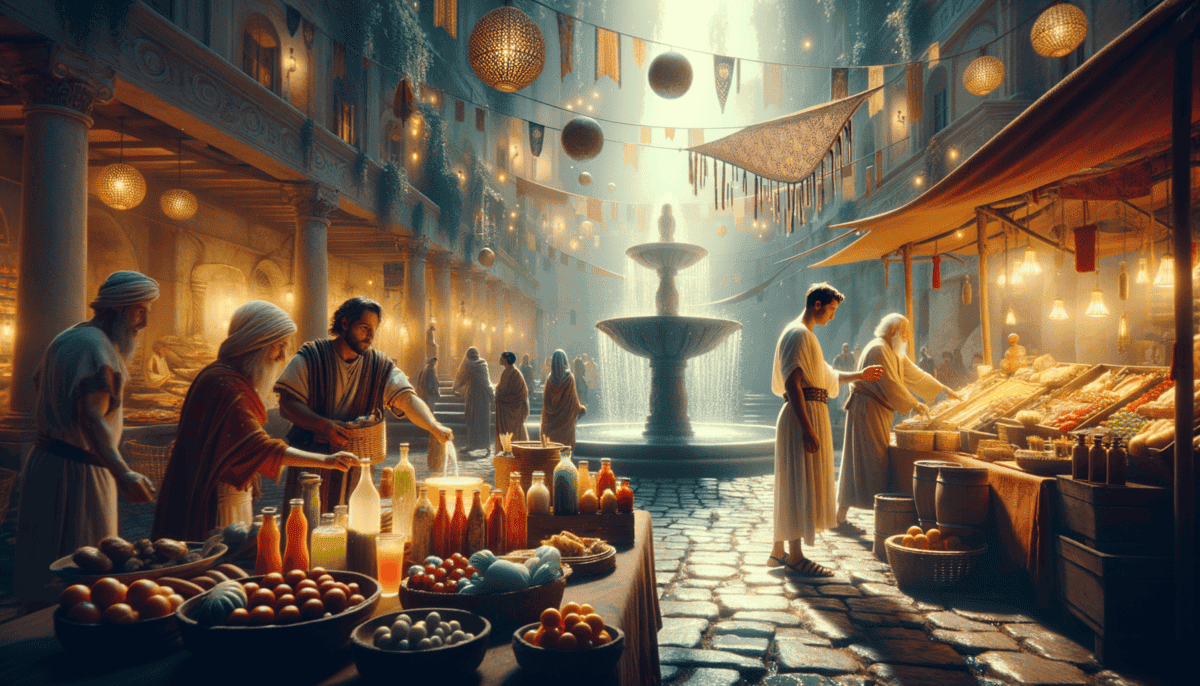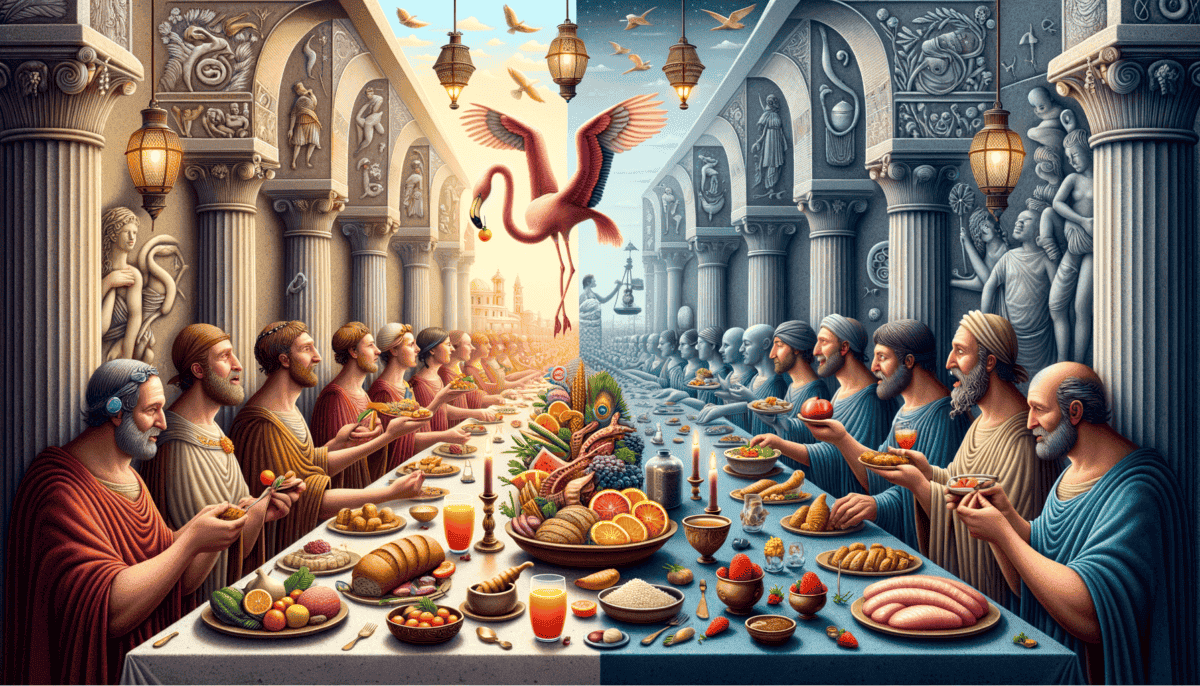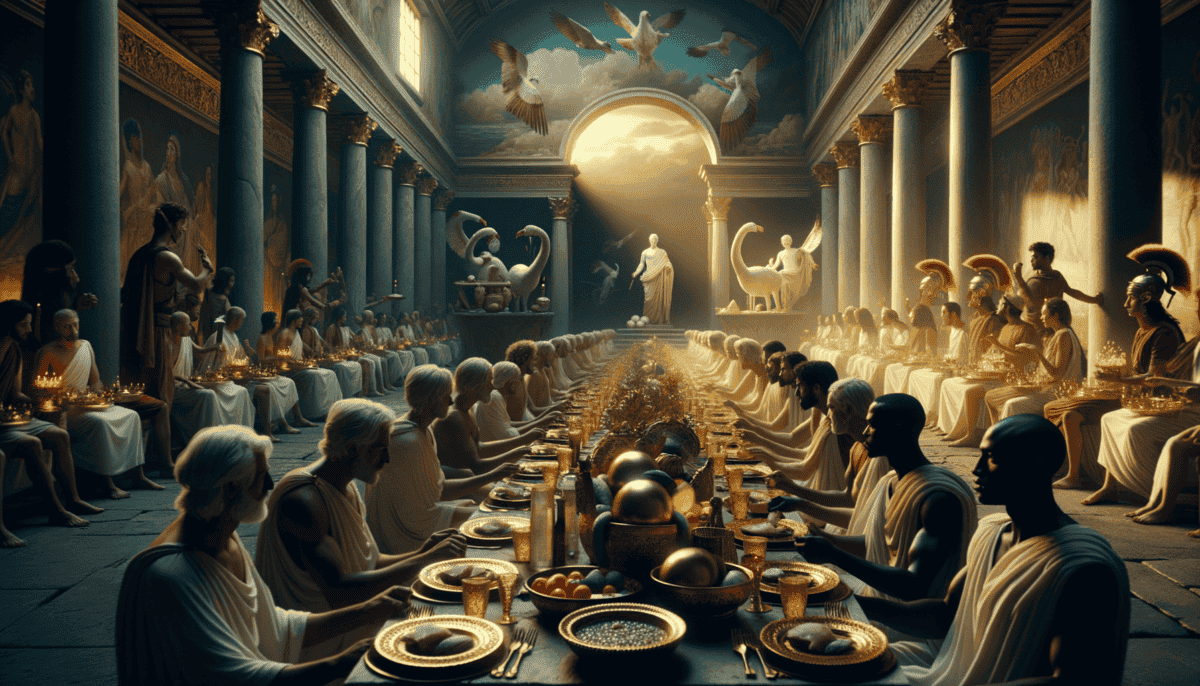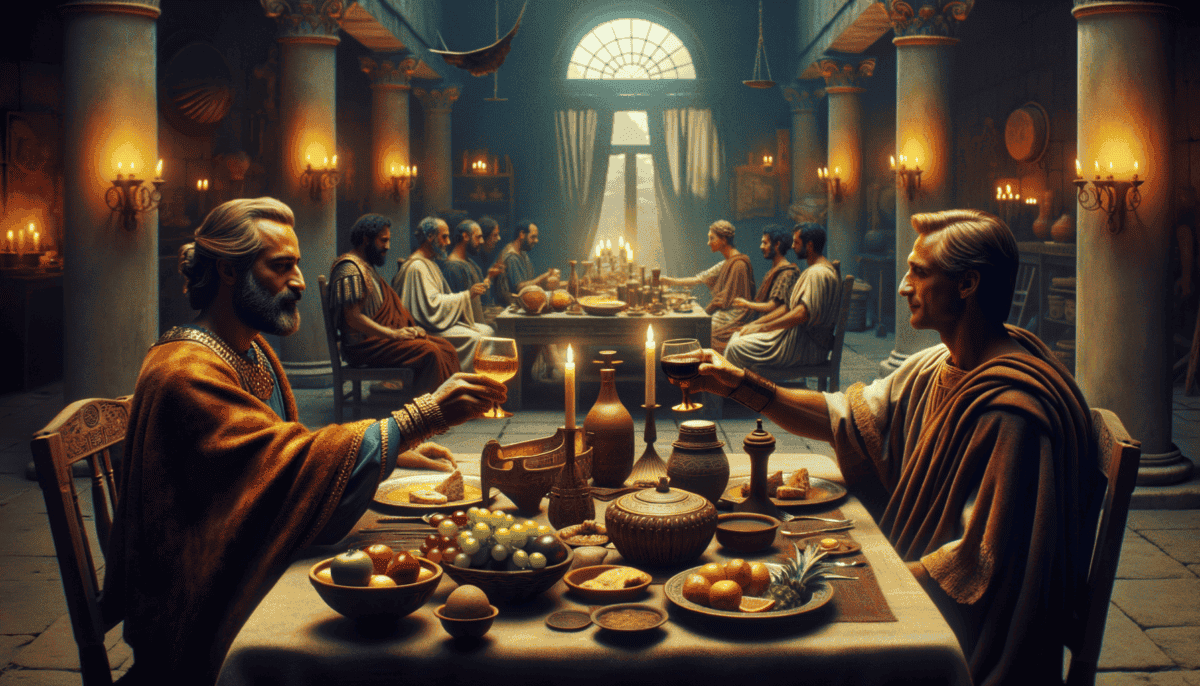The Market Morning
Marcus wiped the sleep from his eyes as the first rays of sunlight peeked through the small window of his family's tiny apartment. The smell of fresh bread wafted up from the bakery below, making his empty stomach growl.
"Time to go to the market!" his mother called cheerfully, though Marcus could see the worry lines around her eyes. She handed him a small cloth bag and three copper coins. "Remember, we need grain and maybe some vegetables if there's enough left over."
The streets of Rome were already bustling as Marcus made his way toward the marketplace. People rushed past him – some in fine silk togas, others in simple wool tunics like his own. The difference between rich and poor was easy to spot, even for a ten-year-old boy.
As Marcus entered the marketplace, his senses were overwhelmed. Colorful stalls lined the streets, each one offering different foods:
• Market Stalls Offerings:
- Fresh fish from the sea
- Fruits from distant lands
- Vegetables from nearby farms
- Bread and grain
- Spices and herbs
- Meats of all kinds
"Fresh figs! Sweet as honey!" called one vendor. Marcus's mouth watered as he watched a wealthy lady in a purple-trimmed toga buy a whole basket full. He clutched his three coins tighter.
“How much for the grain?” Marcus asked a gruff-looking merchant.
“Two coins for a small bag,” the merchant replied.
Marcus carefully counted out his coins. After buying the grain, he had just one copper piece left. He walked slowly past the vegetable stalls, looking for the best deal.
An old woman selling slightly bruised vegetables caught his eye. "Come here, young one," she called with a kind smile. "I see you shopping carefully like your mother taught you."
“The wealthy eat peacocks and boar,” the old woman said, “but a clever shopper can still feed their family well. Here – take these carrots and this slightly spotty cabbage. They’re still good to eat.”
Marcus thanked her, amazed at her generosity. As he turned to leave, he bumped into a wealthy boy about his age. The boy's slave was carrying a basket overflowing with exotic fruits, expensive fish, and even a jar of precious garum sauce.
The rich boy barely noticed Marcus as he pointed to a pile of fresh figs. "I want those too," he commanded. Marcus watched as the slave added them to their already full basket.
Walking home with his modest purchases, Marcus couldn't help but think about how different life was for rich and poor Romans. His family would eat plain porridge made from the grain, flavored with the vegetables from the kind old woman. Meanwhile, in the big houses on the hills, people would feast on exotic dishes from far away lands.
But his mother's smile when he showed her the vegetables made him feel rich in a different way. "You did well today," she said, hugging him. "Now help me prepare our breakfast. Even simple food tastes good when you're hungry!"
Marcus grinned and reached for the cooking pot. The morning market had taught him much about life in Rome – both the hard parts and the sweet ones, just like the figs he couldn't afford to buy.
A Glimpse of Luxury
The next morning, Marcus took a different path home from the market. His bag was lighter today – just a small portion of grain and two wrinkled apples. As he walked up the winding street, he noticed a grand villa with tall columns and colorful walls.
Delicious smells drifted from an open window. Marcus couldn’t help but peek inside. His eyes grew wide at what he saw.
“Boy! You there!” a voice called. Marcus jumped. A friendly-looking cook beckoned him closer. “Would you like to see what we’re making?”
“I don’t want to cause trouble,” Marcus said shyly.
“Nonsense! Come watch – just stay out of the way,” the cook smiled.
The kitchen was amazing! Different cooking stations filled the room. Slaves stirred huge pots and chopped colorful ingredients. Marcus had never seen so much food in one place!
“Tonight is Master Flavius’s birthday feast,” the cook explained. “We’re preparing twenty different dishes!”
Marcus watched in wonder as the cooks prepared:
- Roasted peacock decorated with its own feathers
- Wild boar stuffed with rare spices
- Fish sauce made from special fish
- Sweet honey cakes with imported dates
- Wines mixed with exotic fruits
A young slave girl named Lucia was grinding spices nearby. She smiled at Marcus. “Would you like to smell these? They came all the way from India!”
Suddenly, a well-dressed woman swept into the kitchen. She wore silk clothes and golden jewelry. It was Lady Flavia, the master’s wife!
“Is everything ready for tonight?” she asked.
“Yes, my lady,” the cook bowed. “We have all the special dishes you requested.”
Lady Flavia noticed Marcus. Instead of being angry, she smiled. “Are you interested in cooking, boy?”
“Yes, my lady,” Marcus replied nervously. “But at home, we cook much simpler food.”
Her face softened. “Simple food can be just as good as fancy dishes. Here…” She gestured to a servant, who handed Marcus a small honey cake. “Try this.”
As Marcus headed home, his mind was full of everything he’d seen. The fancy foods, the huge kitchen, the kind lady. He thought about his own family’s dinner – plain porridge again. But somehow, he felt different about it now.
The cook’s words echoed in his head: “Food brings people together, rich or poor. We all need to eat!” Marcus smiled, touching the crumbs of honey cake still on his lips. Maybe rich and poor people weren’t so different after all.
That night, as he helped his mother cook their simple meal, Marcus told her about his adventure. She listened with a twinkle in her eye. “Remember,” she said, “a happy heart makes any food taste better.”
Street Food and Survival
The sun was already hot as Marcus walked through the busy streets of Rome. His stomach growled – it was time for breakfast!
“Fresh bread! Hot bread!” called a street vendor.
“Get your porridge here!” shouted another.
Marcus watched as workers stopped at little food stands for their morning meal. Some bought bread dipped in watered wine. Others got bowls of hot bean soup. This was how most Romans ate every day.
An old man named Rufus waved Marcus over to his food stand. “Here, boy. Try my special lentil stew!”
The stew was thick and warm. It filled Marcus’s belly nicely. As he ate, Rufus taught him about feeding the poor people of Rome:
- Cook simple foods in big batches
- Use salt to make food last longer
- Add herbs to make plain food taste better
- Share with neighbors when you can
- Never waste anything
“We may not eat peacock like the rich folks,” Rufus winked, “but we know how to make good food with what we have!”
Next, Marcus visited the public fountain where people gathered to get water. A kind woman named Julia was there, teaching children how to keep food fresh.
Marcus learned that poor Romans were very clever about food. They:
– Shared cooking fires with neighbors
– Traded different foods with each other
– Found wild herbs growing in the city
– Made soup from leftover bread
– Preserved food for hard times
At lunch time, Marcus sat with other children near the public bakery. They all shared what they had: dried figs, nuts, a bit of cheese.
Later, Marcus helped an old woman preserve olives in salt. She taught him songs that poor people sang while working with food:
“Mix and stir, preserve with care,
Tomorrow’s meal we’ll gladly share,
Though our food be plain and few,
Love makes every bite taste new!”
On his way home, Marcus saw rich people’s slaves buying expensive food at the market. But now he felt proud of how his community worked together to survive. They might not have fancy feasts, but they had something special – they had each other.
The day ended with a neighborhood meal in the street. Everyone brought something to share. Marcus watched as poor Romans – workers, slaves, and children – laughed and ate together under the evening sky.
His mother squeezed his hand. “See? We may not have much, but we know how to make the most of what we have. That’s our strength.”
The Festival Feast
The streets of Rome buzzed with excitement! Today was the Festival of Saturn, when rich people gave free food to everyone. Marcus could hardly believe his eyes at all the decorations.
“Free bread and honey cakes!” shouted one man.
“Fresh roasted meats for all!” called another.
Marcus had never seen so much food in one place. His friend Claudia grabbed his hand. “Look! They’re giving out sweet dates stuffed with nuts!”
A wealthy man named Lucius stood on the steps of his villa. “Welcome, citizens of Rome! Today we feast as equals!”
Marcus watched in wonder as slaves brought out huge platters of food:
- Roasted peacock with golden sauce
- Fish swimming in spiced wine
- Honey-glazed dormice
- Eggs filled with fish sauce
- Strange fruits from far away lands
“Try this,” said a kind cook, handing Marcus a piece of peacock. “It’s what the emperor eats!”
The food was amazing! Marcus had never tasted anything like it.
Marcus saw his friend Rufus from the food stand. “Well, well!” Rufus laughed. “Now you know what peacock tastes like!”
“It’s good,” Marcus smiled, “but I still like your lentil stew better!”
Children played games while they ate. Rich and poor kids laughed together. Nobody cared about who was who today.
A group of musicians played happy songs. People danced in the streets. Even the serious-looking rich people were smiling and clapping along!
“Dance and feast, both rich and poor,
Today we share and want no more,
Saturn’s day brings joy to all,
In Rome’s great feast, no wall’s too tall!”
Marcus saw something interesting. Rich people seemed happier when they shared their food. And poor people taught them fun ways to eat and celebrate.
As the sun set, Marcus sat with a mixed group of people. A rich merchant’s daughter shared her honey cakes. Marcus taught her the food songs he learned from the old woman.
“You see, Marcus,” his mother said, watching the happy crowds, “food can build bridges between people. That’s the real magic of festival days.”
Routes and Riches
Marcus woke up still dreaming about the festival feast. But today was special for a different reason – he would help his uncle at the busy trading docks!
“Wake up, sleepy head!” Uncle Felix called. “The ships are coming in with treasures from far away!”
The docks were alive with action. Huge ships from distant lands floated on the blue waters. Workers carried heavy sacks and colorful boxes.
Uncle Felix showed Marcus different foods from far away places:
- Pepper from India that made you sneeze
- Sweet dates from Egypt
- Olive oil from Spain
- Fish sauce from far-away Britain
- Wheat from Africa
“Smell this!” Uncle Felix held out a small bag. Marcus sniffed and his nose tingled.
“That’s cinnamon from the East. Worth more than gold! Only the richest Romans can buy it.”
A merchant named Quintus smiled at Marcus’s amazed face. “Want to see something special?” He opened a box full of strange round fruits.
Marcus helped count sacks of grain. “This wheat,” Uncle Felix explained, “feeds all of Rome. Without our trading ships, many would go hungry.”
“Even the emperor’s bread comes from these ships!” a sailor shouted proudly.
A group of workers sang as they carried heavy jars of olive oil:
“From Spain to Rome the oil does flow,
Through stormy seas both high and low,
To light our lamps and feed our young,
The trader’s tale must now be sung!”
Marcus watched as rich merchants argued over prices. “Why do they pay so much?” he asked.
A kind merchant gave Marcus a piece of orange to try. The sweet juice exploded in his mouth!
“You see,” Uncle Felix said, “Rome is like this orange. We need farmers to grow food, sailors to bring it here, merchants to sell it, and people to enjoy it. Everyone plays a part!”
As the sun set, Marcus helped his uncle close up the counting house. He thought about all the people who worked together to bring food to Rome. Maybe rich and poor weren’t so different after all – everyone needed to eat!
A Special Invitation
The next morning, Marcus walked along the familiar market street. But today felt different. After learning about trade at the docks, he saw the market with new eyes.
“Good morning, young Marcus!” called Quintus, the kind merchant from yesterday. “I have something to ask you.”
Quintus smiled warmly. “Would you and your family join me for dinner tonight? Your uncle Felix told me how helpful you were at the docks.”
That evening, Marcus and his family walked to Quintus’s beautiful house. His mother wore her best dress, and his father had combed his hair neatly. ✨
“Welcome, welcome!” Quintus greeted them at the door. “Tonight, we feast as friends!”
The dining room was amazing! Soft cushions surrounded a low table. Delicious smells filled the air. ️
“Before we eat,” Quintus announced, “I want to share something special.” He clapped his hands, and servants brought in a simple loaf of bread.
“This bread,” Quintus explained, “was made from the wheat you helped count yesterday, Marcus. Without hardworking people like you and your uncle, none of us would eat.”
Everyone took a piece of the warm bread. Rich and poor, they broke bread together as equals. Marcus’s heart felt full of joy.
As they ate and laughed together, Marcus thought about his journey. From the busy marketplace to the grand festival, from the bustling docks to this wonderful dinner – food had shown him that all Romans were connected.
“To new friendships,” Quintus raised his cup. “And to Marcus, who reminded me that the best meals are shared with good company!”
From that day on, Marcus understood that while some Romans ate from golden plates and others from wooden bowls, food brought everyone together. The markets, festivals, trade ships, and shared meals all told the same story – in Ancient Rome, food was the great connector. ⭐
Marcus never forgot that special evening. Years later, when he became a successful merchant himself, he always remembered to share his good fortune with others, just as Quintus had shared with him.

